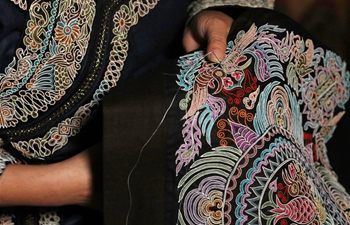CHICAGO, July 6 (Xinhua) -- Researchers at Washington University School of Medicine in St. Louis and Rush University in Chicago have found a chemical compound that promotes a vigorous immune assault against pancreatic cancer.
The chemical compound extends survival by months in mice. The findings suggested a way to improve immunotherapy for the deadly disease in patients.
The researchers identified a compound, called ADH-503, that interferes with the migration of myeloid cells. Normally, pancreatic tumors are teeming with myeloid cells that suppress the immune response.
When the researchers gave the compound to mice with pancreatic cancer, the number of myeloid cells in and near the tumors dropped, and the remaining myeloid cells were of the kind that promoted, rather than suppressed, immune responses.
This environment translated into greater numbers of cancer-killing T cells in the tumor, significantly slower tumor growth and longer survival.
Then, the researchers investigated whether creating this same environment could make pancreatic tumors susceptible to standard immunotherapy. First, they treated mice with a so-called PD-1 inhibitor, a standard immunotherapy used to treat other kinds of cancer.
Unsurprisingly, they saw no effect. But when the researchers gave the mice the immunotherapy in conjunction with ADH-503, the tumors shrank and the mice survived significantly longer.
In some experiments, all the tumors disappeared within a month of treatment, and all the mice survived for four months, when the researchers stopped monitoring them. In comparison, all the untreated mice died within six weeks.
"Pancreatic cancer is a highly lethal disease, and we are in desperate need of new therapeutic approaches," said co-senior author David DeNardo, an associate professor of medicine and of pathology and immunology at Washington University School of Medicine. "In animal studies, this small molecule led to very marked improvements and was even curative in some cases. We are hopeful that this approach could help pancreatic cancer patients."
While pancreatic cancer is the third leading cause of cancer-related death in the United States, only about three percent of clinical trials for cancer immunotherapies target pancreatic cancer.
"You can't make a one-to-one translation between animal studies and people, but this is very encouraging," DeNardo said. "More study is needed to understand if the compound is safe and effective in people."
The findings were published on Wednesday in Science Translational Medicine.













